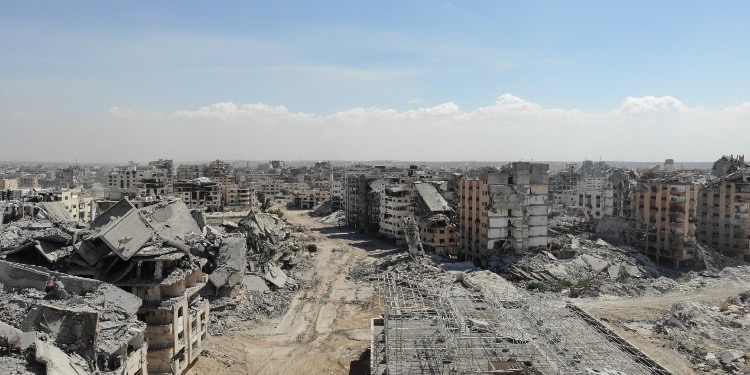As the international community watches closely, the recent peace deal between Israel and Hamas in Gaza has the potential to reshape the geopolitical landscape of the Middle East. While the primary focus of the agreement is to bring an end to years of violence, the ramifications will be felt far beyond the borders of Gaza, particularly in countries like the United Kingdom. From increased foreign aid commitments to the potential for more Palestinian immigrants to arrive in the UK, the consequences of the deal are complex and multifaceted.
This article explores how the Gaza peace deal might affect the UK, with a particular focus on the role of British taxpayers in supporting Gaza’s recovery, as well as the resettlement of Palestinian refugees in the UK.
The Peace Deal: A Glimmer of Hope or a Temporary Fix?
The peace deal brokered between Israel and Hamas, if fully realised, represents a significant turning point in the decades-long Israeli-Palestinian conflict. Under the terms of the deal, Gaza will see a reduction in blockades, improved access to essential goods, and commitments to rebuilding infrastructure that has been decimated by years of conflict. However, the sustainability of peace in the region remains uncertain, with both political and military challenges ahead.
For the UK, the deal represents both an opportunity to contribute to regional stability and a potential challenge in terms of the resources required to aid the reconstruction efforts in Gaza. While the UK government has long supported a two-state solution and worked towards peace in the region, there is growing concern over how much of this effort will fall to British taxpayers.
Increased Foreign Aid to Gaza
The UK has historically provided substantial foreign aid to Gaza, and the peace deal is likely to result in further commitments. Prime Minister Rishi Sunak’s government has already indicated that Britain will be increasing its financial support for humanitarian aid and reconstruction in Gaza, as part of its broader commitment to peace in the Middle East.
In the wake of the peace deal, the UK has pledged to send additional aid to Gaza, which could include:
Humanitarian Assistance: Immediate relief, including food, medical supplies, and clean water, will be crucial for the population of Gaza. Aid will likely focus on helping the most vulnerable, including children, the elderly, and those with medical needs.
Infrastructure Rebuilding: The decades of conflict have left Gaza with widespread damage to homes, schools, hospitals, and other vital infrastructure. UK taxpayers can expect to see increased financial commitments to help rebuild Gaza’s infrastructure, including the construction of schools, healthcare facilities, and roads.
Support for Refugees: There will also be a significant portion of the aid directed at supporting refugees both within Gaza and in neighbouring regions, helping to ensure their safety and provide long-term accommodation.
Security and Peace-Building: Part of the UK’s foreign aid package will also likely include support for peace-building efforts, such as providing funding for dialogue between Palestinian factions, training for police forces, and supporting institutions that can help to maintain peace in the region.
While the UK’s role in Gaza is intended to help the people of Gaza recover and rebuild, the issue of foreign aid is a contentious one for many Britons. With the UK government having already faced criticism over its foreign aid spending in other areas, the decision to significantly increase aid to Gaza will likely provoke debate among taxpayers. Critics may argue that while the peace deal is important, the priority should be on addressing domestic issues such as the cost of living crisis, healthcare, and public services in the UK.
The Impact of a Resettlement Scheme for Palestinian Immigrants
In addition to foreign aid, another significant implication of the Gaza peace deal for the UK could be the resettlement of Palestinian refugees. While the UK government has not yet confirmed any official scheme, there is growing pressure from some political figures and humanitarian groups to provide sanctuary for Gazans in an already-thinly-stretched refugee resettlement budget.
The potential resettlement of Palestinian refugees to the UK could come as part of a broader international effort to protect those most at risk in Gaza. This would follow in the footsteps of previous refugee resettlement schemes that the UK has supported in other regions, including Syrian refugees in the aftermath of the civil war.
Public Reaction: Balancing Humanitarian Efforts and Domestic Priorities
The British public’s reaction to both the increase in foreign aid and the potential for Palestinian resettlement will likely be mixed. While there is a long-standing tradition of offering support to those affected by international conflicts, there are concerns about the UK’s ability to manage both its domestic issues and its foreign commitments.
Many taxpayers may question whether additional aid to Gaza is the best use of government resources at a time when the UK faces economic challenges, including high inflation, rising energy costs, and the ongoing strain on the National Health Service (NHS). Similarly, the prospect of increasing immigration in the form of Palestinian refugees may trigger concerns among those who feel that the UK’s immigration policies are already stretched.
A Complex and Uncertain Future
The peace deal in Gaza presents both an opportunity and a challenge for the UK. While the prospect of peace is welcome, the UK will likely face increased pressure to provide both foreign aid for Gaza’s reconstruction and asylum for displaced Palestinians. The consequences of this deal will be felt across the UK, from the wallets of taxpayers to the resources of local communities. As the situation in Gaza evolves, it will remain to be seen how the British government balances its humanitarian commitments with the domestic priorities of its citizens.













































































